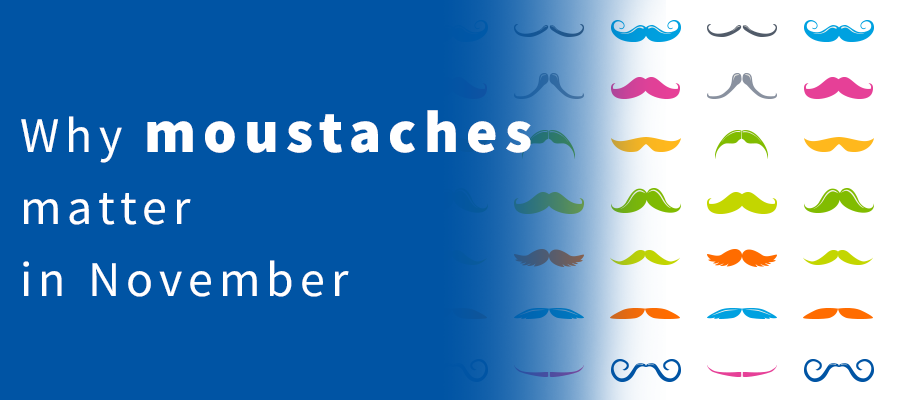9 Nov 2017
As the men in our lives begin their month long campaign to grow facial hair, we look to see how this annual event, that has taken over the imagination of men (and women), supports cancer research.
In 2003, two friends (Travis Garone and Luke Slattery) in Melbourne Australia wanted to bring back the mode of moustaches, as they believed that moustaches had become unfashionable. They charged 10 dollars and signed up 30 men to grow their moustaches in the month of November. The campaign was so successful that in 2004, they decided to harness the concept in order to get more men involved in growing moustaches. They decided to donate their proceeds to a disease related to men’s health, prostate cancer being their first target area.
The Movember Foundation was founded in 2006, to raise awareness and funds for men’s health. Its funding priority areas now include testicular cancer, mental health and suicide prevention, as well as its original cause of prostate cancer. It has now official campaigns in 21 countries raising more than AUD 850 million to fund over 1,200 men’s health programmes.
In testicular cancer, the Movember Foundation has donated 1.2 million EUR for the TIGER trial, which supports EORTC, in collaboration with the Australian and New Zealand Urogenital and Prostate Clinical Trials Group (ANZUP), to investigate which of the two current and commonly used treatments is more effective in preventing death in men who show a relapse of testicular cancer. Alliance (US-NCI) is the leading group of the trial and EORTC will coordinate the participation of national groups in France, Germany, UK, Ireland and Italy and other European countries.
Testicular cancer is a highly treatable disease with approximately 95% of men being effectively cured using standard therapy. However, in a small number of men, the disease returns and these men often have a poorer outcome in terms of overall survival and side effects of more toxic treatments. The current standard therapy varies around the world and the TIGER trial aspires to determine which of the current two treatments is more effective. Given that relapse after chemotherapy is quite rare in testicular cancer, a large number of recruiting centres are required to efficiently accrue patients into the study. The goal is to recruit 420 patients worldwide, with 192 of these scheduled to be recruited in European countries and 60 in Australian and New Zealand sites. Currently, 48 sites have been activated globally, of which 13 are European sites and 67 patients are enrolled in the study (as of 2nd November 2017).
The EORTC-1407-TIGER trial is a randomised phase III trial comparing conventional-dose chemotherapy using paclitaxel, ifosfamide, and cisplatin (TIP) with high dose chemotherapy using mobilizing paclitaxel followed by High-dose carboplatin and etoposide (TI-CE) as first salvage treatment in relapsed or refractory germ cell tumours. At present, there are numerous practices in salvage approaches: to use conventional chemotherapy or to use high dose chemotherapy with autologous stem cell transplant (ASCT). The trial strives to define standards of clinical practice and outcomes in salvage treatments for the men potentially reducing side effects.
“Testicular cancer is often an overlooked and underfunded disease because of the ease of detection and treatment – relative to most other cancers,” said Owen Sharp, CEO, Movember Foundation. “This means that outcomes for men diagnosed with testicular cancer are generally positive. However, in a small percentage of men, the disease will return after treatment and at the current time, the prospects for these – often young – men are very poor indeed. Something needs to be done, and this project represents a significant step towards improving the treatments available to these men and creating evidence as to which treatment regime works best. What is most exciting about this project is the bringing together of world leading clinicians in Australia, Europe and North America. The Movember Foundation is particularly proud of being able to leverage its global footprint to fast track outcomes such as the TIGER trial.”
”Although more than 90% of men will be cured, a lot of effort needs to be made to secure a future for the 10% of young men that escape this initial treatment. This requires very large number of participating centres and a lot of effort from investigators and patients across and beyond Europe.” said Professor Bertrand Tombal, EORTC President and Professor in Urology at Cliniques Universitaires Saint Luc, Université Catholique de Louvain, Brussels, Belgium. “Such academic trials would not be possible without the support of charities such as Movember. For each of us that support Movember, it will be more opportunity for these young patients.”
To enrol in this study please go to this page.
Related News
EORTC: Advancing research and treatment for rare cancers
29 Feb 2024
EORTC Fellowship Programme: celebrating more than 20 years of impactful collaboration
22 Feb 2024
Appointment of Malte Peters as EORTC Strategic Alliance Officer
9 Feb 2024
Unique series of workshops in partnership with the European Medicines Agency (EMA)
7 Feb 2024
EORTC launches a prominent clinical trial in older patients with locally advanced (LA) HNSCC (Head and Neck Squamous Cell Carcinoma)
14 Dec 2023
Seven IMMUcan abstracts selected for ESMO Immuno-Oncology Congress 2023
6 Dec 2023
EORTC Quality of Life measures integrated in CDISC
20 Nov 2023
EORTC and Immunocore are collaborating to launch the ATOM clinical trial of tebentafusp in Adjuvant Uveal Melanoma
7 Nov 2023
Treatment with decitabine resulted in a similar survival and fewer adverse events compared with conventional chemotherapy in older fit patients with acute myeloid leukaemia
31 Oct 2023
New results and forthcoming EORTC trials in rare cancers, lung, head and neck, and breast carcinomas presented at ESMO 2023
20 Oct 2023


